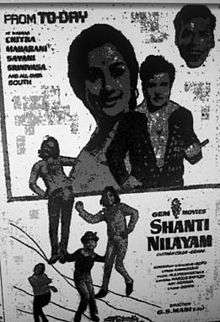Shanti Nilayam
| Shanti Nilayam | |
|---|---|
 Theatrical Poster | |
| Directed by | G. S. Mani |
| Produced by |
G. S. Mani S. S. Vasan |
| Written by | Chitralaya Gopu[1] |
| Starring |
Gemini Ganesan Kanchana |
| Music by | M. S. Viswanathan |
| Cinematography | Marcus Bartley |
| Edited by | Umanath |
Production company |
Gemini Studios |
Release dates |
|
Running time | 149 minutes[2] |
| Country | India |
| Language | Tamil |
Shanti Nilayam (Peaceful House) is a 1969 Indian Tamil-language film produced and directed by G. S. Mani. Starring Gemini Ganesan and Kanchana in the lead roles, it has Nagesh, Pandari Bai, K. Balaji and V. S. Raghavan in supporting roles. The film won the National Film Award for Best Cinematography for Marcus Bartley.[2]
Plot
Gemini Ganesan and Kanchana play the lead roles in Shanthi Nilayam. Gemini as the father of many kids and Kanchana as the governess are excellent. The children are played by Ramaprabha, Manjula, and Prabhakar.
Pandari Bai plays the rich aunt and Nagesh as her son provides the laughs. K. Balajee plays the villain who blackmails the hero’s father (V.S. Raghavan), for having murdered his servant (K.V. Srinivasan), and later, the hero.
Cast
- Gemini Ganesan as Bhaskar
- Kanchana as Malathi
- Vijayalalitha as Sheela
- Nagesh as Ramu
- K. Balaji as Balu
- Pandari Bai as Ramu's mother
- V. S. Raghavan as Bhaskar's father
Production
Shanthi Nilayam was a remake of the Kannada film Bedi Bandavalu (1968) starring Kalyan Kumar and Chandrakala which was adapted from The Sound of Music (1965).[3] S. S. Vasan saw the Kannada film and bought the remake rights for it. He assigned Chitralaya Gopu to write the screenplay and dialogues for the Tamil version. Although Vasan liked the screenplay, he felt that the film would not cater to the rural audience. Gopu, in turn, felt that Vasan's doubts would be overcome if Nagesh's comic potential. Vasan's words however proved to be true as the film ran well only in cities and not so much in smaller towns.[3]
Gopu recommendation of Kanchana for the lead heroine role was agreed by the film's director Mani.[3] The film was entirely shot at Ooty and art director Mohana Kumari was in charge of erecting the special sets required to shoot the film's scenes.[3] The flying hellium balloon in the song "Bhoomiyil Iruppadhu" was one of the highlights. Camera techniques were used in the song to show that the balloon was flying while in reality it was not.[3]
Influences
According to film critic Randor Guy, Shanti Nilayam, though widely believed to have been adapted from The Sound of Music, was actually based on Charlotte Bronte's novel Jane Eyre.[4]
Songs
S. P. Balasubrahmanyam made his debut in Tamil cinema with this film by singing the song "Iyarkai ennum".[3]
| Track list[5] | ||||
|---|---|---|---|---|
| No. | Title | Lyrics | Singer(s) | Length |
| 1. | "Iyarkai ennum" | Kannadasan | S. P. Balasubrahmanyam, P. Susheela | 3.29 |
| 2. | "Kadavul orunaal" | Kannadasan | P. Susheela | 4.33 |
| 3. | "Boomiyil Irupathum Vanathil" | Kannadasan | T. M. Soundararajan | 3.02 |
| 4. | "Selvangale" | Kannadasan | P. Susheela | 3.08 |
| 5. | "Pennai parthum" | Kannadasan | 3.24 | |
| 6. | "Iraivan varuvaan" | Kannadasan | P. Susheela | 3.52 |
| Total length: | 16.96 | |||
Reception
Randor Guy wrote in his review that the film would be "Remembered for: the interesting storyline, excellent performances, brilliant cinematography and pleasing music."[4]
References
- ↑ Kumar, S. R. Ashok (18 February 2010). "In relaxed mood - 'Chitralaya' Gopu". The Hindu. Retrieved 21 February 2012.
- 1 2 3 Dhananjayan 2014, p. 208.
- 1 2 3 4 5 6 Dhananjayan 2014, p. 209.
- 1 2 Guy, Randor (28 March 2015). "Shanthi Nilayam 1969". The Hindu. Archived from the original on 1 August 2016. Retrieved 29 March 2015.
- ↑ "Shanti Nilayam songs". Raaga.com. Archived from the original on 13 December 2014. Retrieved 21 February 2012.
Bibliography
- Dhananjayan, G. (2014). Pride of Tamil Cinema: 1931 to 2013. Blue Ocean Publishers. ISBN 978-93-84301-05-7.